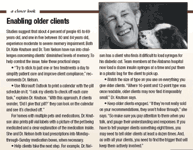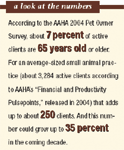Aging with grace
By 2010, almost 40 million Americans will be 65 years old or older. Are you prepared to meet the needs of these clients?
In case you haven't noticed, you're getting older. And you're not alone; time waits for no man, woman, or four-legged friend.
Your clients are living longer, more prosperous lives than any generation before. Driven by the baby boom bulge, the number of people aged 65 and older will steadily increase from 34.8 million in 2000 to 53.7 million in 2020, according to the U.S. Census Bureau—an increase of 54 percent. Even more striking, the number of people 85 years old and older will more than double to 6.8 million by 2020.

A closer look : Enabling older clients
What this means for veterinary practitioners is obvious—in the future you'll need to do an excellent job serving the needs of older clients. Not sure how to cater to this aging generation? Start with this: What older clients need is ... a pet.
A scientific prescription for pets
Alan Beck and Aaron Katcher, MD, are the fathers of the notion of the "pet prescription." In the early 1980s when veterinarians and teachers approached the concept of the human-animal bond from the animal side, Beck and Dr. Katcher approached the idea from the human side.
One of the first, and most influential, studies, "Animal Companions and One-Year Survival of Patients After Discharge From a Coronary Care Unit," was published by Erika Friedmann, Katcher, and others in Public Health Reports in 1980. Their findings suggested that pet owners experienced better survival rates in their first year after being discharged from a coronary care unit than those without pets. Since then, the idea that pets are good for health and the science behind the theory have been refined by researchers who continue to document the benefits of pet ownership.
Two theories guide current research. One is the biophilia hypothesis, which supposes humans developed a hard-wired need for communion with animals in their earliest hunting and gathering days. The second is the social support theory, which posits health benefits from human social contact. Researchers see only a small step separating pets from being viewed as full-fledged family members that contribute a special and important kind of social support.
In 1987, Beck, who holds a doctorate of science degree in animal ecology, told attendees of a National Institutes of Health workshop on the health benefits of pets that "all future studies of human health should consider the presence or absence of a pet in the home .... No future study of human health should be considered comprehensive if the animals with which (the subjects) share their lives are not included."
Older people, in particular, seem to benefit from owning pets. In a 2002 article co-authored by Nancy Edwards, Beck points out Alzheimer's disease "will reach epidemic proportions by the middle of this century, increasing by 350 percent by 2050, unless effective methods for prevention and treatment are developed." The study examined the effects of animal-assisted therapy, specifically fish aquariums, on the eating habits of Alzheimer's patients. The result: Nutritional intake and weight increased significantly.

One solution for fretful clients: Give them a job
Of course, popular literature has long been full of feel-good stories about the health benefits of pets. Beck, who heads the Center for the Human-Animal Bond at Purdue University School of Veterinary Medicine, says he continues to be amused at parties when people say to him, "Did you know that when you pet an animal your blood pressure goes down?" That's no news to Beck, as he and Dr. Katcher did the original study. Since then, a dozen universities have created centers to study the effects of animals on humans.
So you know your clients are getting older, and you realize their pets are good for them. What do you do with those two ideas? Dr. Kate Knutson, co-owner of the Pet Crossing Animal Hospital and Dental Clinic in Bloomington, Minn., is using those ideas to tailor her practice to the needs of her older clients.
Working with older clients
When Dr. Knutson talks about serving older clients, she repeatedly uses the word "community." For her, the idea of meeting the needs of older clients is about community on several levels.

A look at the numbers
First, she talks about the professional veterinary community: "It's important for our community to help make the aging process as graceful as possible for the people who bring their pets to us."
Next, she talks about the community within her suburban Minneapolis animal hospital: "Our team sees firsthand the need to accommodate older clients. We're located in an older community, and some of our best clients have gotten Parkinson's or Alzheimer's diseases."
Third, she talks about the larger community: "We seek to serve our neighborhood community as a whole, not just our patients and clients. So we look for ways to reach out."
One way the four-doctor practice supports the neighborhood is through the local gathering place for seniors. "Our team members often give talks at the senior community center," Dr. Knutson says.
The hospital also has a volunteer pool that taps the energy and enthusiasm of older people to help recover surgery cases, provide a little TLC to hospitalized patients, and walk the dogs. "This makes most vets cringe because of potential liabilities," she admits. "But I think it's one of the best things we do. A lot of people don't have someone to cuddle with at home, and it's so good for them to give—and receive—comfort from our four-legged friends. It's amazing to watch. Plus, our patients are calmer and have faster recoveries when they have a caregiver."
Dr. Knutson maintains that veterinary professionals have a special role with the elderly in their communities. The veterinary team may see the changes in an aging client before any other health professional does, she says. A client may see her doctor twice a year and several specialists in between, but, if she has an aging cat or dog, she'll visit the veterinary clinic a half-dozen times a year, sometimes a half-dozen times a month.
"We're the nutritionist, oncologist, dentist, internal medicine specialist; we're the place that boards their pet. We see our clients more often," says Dr. Knutson. "And if we have a client not taking insulin, we can sometimes be aware of that. We may recognize the onset of Alzheimer's or recognize that a client isn't as cognizant as he or she was before. We're the ones who see them run over the curb in the parking lot for the first time."
In just such case a year-and-a-half ago, a regular client gave everyone in Dr. Knutson's hospital a scare when he was late to pick up his dog after dental surgery. "This man was always right on time," she recalls. "It was very unusual for him to be an hour-and-a-half late. We thought, 'It's dark out, and we have an 80-something-year-old man we're worried about.'"
This sense of emergency brought the staff together to brainstorm how to locate a relative. The team searched through records and called current and past practice employees. Someone recalled that his daughter was a former client who'd euthanized her dog four years prior. Finally someone remembered her dog's name and was able to find her through old records.
The hospital called the daughter and, with her, initiated a full-scale hunt of the neighborhood around the hospital. The client was found, but the incident revealed his diminished mental acuity. "Now we always—always—obtain an emergency number for our clients," Dr. Knutson says.
In a bittersweet way, Dr. Knutson discovered yet another role for the veterinarian serving older clients. One of her older clients came to the hospital worrying about a friend she was caring for. Her friend was battling cancer, and the fight was not going well. "There's something really bothering us," she confided to Dr. Knutson. "We just don't know what will happen to her cat when she dies."
Dr. Knutson's answer was immediate. "I said, 'We'll take him. We'll find a home for him. Ask her what her parameters for the home are.'"
The ill woman wanted to see her cat with a family in which someone would be home during the day and that would provide good medical care. She didn't want her cat to be passed back and forth among owners or to the humane society.
Twenty-four hours after the woman relayed her wishes for her beloved cat, she died, Dr. Knutson says. Now the hospital team is always ready to set clients' minds at ease about what will happen to their pets after their deaths.
Occasionally the situation between older clients and their pets is reversed. Dr. Tom Nelson, one of seven veterinarians at the Animal Medical Center in Anniston, Ala., hates to see older clients give up on owning pets after they lose one at the exact stage in life when they're feeling their own mortality.
"I recommend everybody have a pet, especially older people," he says. "But often the older people we see who've lost a pet don't want another one. They say the loss hurt too much, so they're afraid. And yet you can see how much the quality of their lives is improved when they have a pet."
His solution for clients he thinks can handle another pet? He picks one out for them and then calls the client into the hospital. "I tell a white lie that the animal was abandoned," he confesses. "I ask them, 'Can you help me out for a few weeks? I don't want to keep this guy at the hospital.' I know when I do it that pet's not going anywhere in a few weeks but has found a very permanent home."
A client in Beaumont, Texas, left an indelible lesson with Dr. Nelson about the value pets hold for the elderly. "This woman had lost her husband, and she'd lost her son in Vietnam," he says. "Then she lost her little dog. She asked me not to bury the dog just yet, to let her sleep with it and bury it in the morning. She went downhill from there on. After that, I decided to do everything I could to make sure my older clients would have another pet when they lost one."
Dr. Nelson and other veterinarians have long pushed nursing homes to make room for pets, too. A recent study by psychology researchers June McNicholas, Ph.D., and Glyn Collis, Ph.D., at the University of Warwick found a variety of social and physical problems for United Kingdom pet owners forced to give up their animals when they entered nursing facilities. Such patients were more bothered by the move, took longer to make friends, found sleeping more difficult, and were reluctant to tell staff members how much losing their pets hurt them.
"If you've ever taken pets to nursing homes, you've seen it," Dr. Nelson says of the human-animal bond. "Some people in nursing homes don't have anyone who comes to see them. When you visit with a pet, you see their faces light up, and you see their spirits lift."
The bottom line
Your clients' reliance on their pets likely grows with age. And pet ownership offers proven health benefits. But older clients may have more trouble providing the level of care their pets need. The key: Start positioning your practice for success with this growing demographic today.
A healing paw
Want more information on the healing power of pets? Try Veterinary Economics Practice Leadership Editor Dr. Marty Beckerâs book The Healing Power of Pets: Harnessing The Amazing Ability of Pets to Make and Keep People Happy and Healthy (Hyperion, 2003).
Special Assignments Editor John Lofflin is a freelance writer based in Kansas City, Mo. Please send comments or questions to ve@advanstar.com.